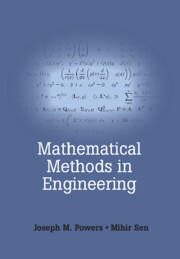Book contents
- Frontmatter
- Dedication
- Contents
- Preface
- 1 Multivariable Calculus
- 2 Vectors and Tensors in Cartesian Coordinates
- 3 First-Order Ordinary Differential Equations
- 4 Linear Ordinary Differential Equations
- 5 Approximation Methods
- 6 Linear Analysis
- 7 Linear Algebra
- 8 Linear Integral Equations
- 9 Dynamical Systems
- Appendix A
- References
- Index
4 - Linear Ordinary Differential Equations
Published online by Cambridge University Press: 05 February 2015
- Frontmatter
- Dedication
- Contents
- Preface
- 1 Multivariable Calculus
- 2 Vectors and Tensors in Cartesian Coordinates
- 3 First-Order Ordinary Differential Equations
- 4 Linear Ordinary Differential Equations
- 5 Approximation Methods
- 6 Linear Analysis
- 7 Linear Algebra
- 8 Linear Integral Equations
- 9 Dynamical Systems
- Appendix A
- References
- Index
Summary
We consider in this chapter linear ordinary differential equations. We have already introduced first-order linear differential equations in Chapter 3. Here we are mainly concerned with equations that are second order or higher in a single dependent variable. We review several topics that are commonly covered in undergraduate mathematics, including complementary functions, particular solutions, the superposition principle, Sturm-Liouville equations, and resonance of a sinusoidally forced linear oscillator. We close with a discussion of linear difference equations. Strictly speaking, these are not differential equations, but they certainly arise in many discretized forms of linear differential equations, and their solution has analog to the solution of differential equations. Intrinsic in much of our discussion will be the notion of oscillation at a variety of frequencies. This lays the foundation of the exercise of seeking repetitive patterns, a topic of relevance in engineering. The chapter also introduces the important concept of representation of a function by infinite trigonometric and nontrigonometric Fourier series, as well as projection of a function onto a basis composed of a finite Fourier series. This motivates important abstractions that will be considered in detail in the later Chapter 6. Advanced topics such as Green's functions for particular solutions and discrete/continuous spectra are included as well. All of these topics have relevance in the wide assortment of engineering systems that are well modeled by linear systems. We will provide some focus on linear oscillators, such as found in mass-spring systems. Analogs abound and are too numerous to be delineated.
Linearity and Linear Independence
An ordinary differential equation can be written in the form
Ly = f(x),
where L is a known operator, y is an unknown function, and f(x) is a known function of the independent variable x. The equation is said to be homogeneous if f(x) = 0, giving, then,
Ly = 0.
This is the most common usage for the term homogeneous. The operator L can involve a combination of derivatives d/dx, d2/dx2, and so on.
- Type
- Chapter
- Information
- Mathematical Methods in Engineering , pp. 146 - 218Publisher: Cambridge University PressPrint publication year: 2015



